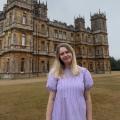
Two Sunderland academics have taken part in a prestigious Dementia events programme, sharing their "important research" on the condition that affects nearly one million people a year.
Dr Heather Yemm and Dr Joe Butler were amongst scientists from across the region taking part in the ‘Meet the Experts’ and ‘Our Wonderful Brains’ programme held in the Life Sciences Centre in Newcastle Upon Tyne.
Dr Yemm and Dr Butler, both based in Sunderland University’s Helen McArdle Research centre, presented their research that has been looking into personal and family experiences of living with dementia.
Read more: Vicky McClure accuses Government of 'failing' dementia patients
She said: "The discussions on the day were hugely engaging and I hope those who attended got something meaningful from the experience.

"Many people kindly shared their own stories and experiences of dementia, and it was great to see how positive people were about the research we’re engaged with and about supporting people living with dementia."
Dr Yemm, a research fellow at Sunderland’s Helen McArdle Research centre, has been commissioned to evaluate the Admiral Nurse Service funded by Dementia UK.
The pilot scheme, that runs for three years, will have its "strength, impact and effectiveness" tested by Dr Yemm.
Alongside Dr Yemm, Dr Butler, a NIHR Research Fellow (National Institute for Health and Care Research) is involved in developing tools to earlier detect Alzheimer’s Disease.
Working with other scientists from Northumbria and Strathclyde Universities, Dr Butler’s work praised the "very positive" feedback from the event.
He said: "Our group is focused around developing assessments tools for the early detection of Alzheimer’s diseases and a general interest in memory binding.
"We have recently developed a short computer task where the person has to memorise coloured shapes and takes about 15 minutes to complete.
He added: "Previous research has shown that the task can identify individuals with Alzheimer’s Disease, so to have developed a version which people can accurately self-administer and without a researcher having to be present opens up new opportunities for research and may help us to identify new risk factors."

Samantha Turner, Public Engagement Manager at Alzheimer’s Research UK, praised the event, and said it is "vital to confront misconceptions about dementia."
She added: "By engaging with the public in unique and creative ways, we believe that we can contribute to the changing of attitudes towards dementia.
"The ‘Our Wonderful Brains’ event enabled us to reach underserved audiences, and to showcase the life-changing research that’s bringing forward new ways to treat, diagnose and prevent the diseases that cause dementia."
Statistics on Dementia show that 944,000 people live with the condition in the UK – with this number set to increase to to 1.1 million by the year 2030.
Ben Rutherford-Orrock, Contemporary Science Manager at Life Science Centre, said: "At Life, our mission is to inspire everyone to explore and enjoy science and to discover its relevance to their own lives.
"Some subjects - like dementia - can be daunting. So it’s important to help families explore issues like this through engaging and fun activities like the ones offered at this event."
Read next:
Ben Houchen cancels appearance at Transport for the North conference



Comments: Our rules
We want our comments to be a lively and valuable part of our community - a place where readers can debate and engage with the most important local issues. The ability to comment on our stories is a privilege, not a right, however, and that privilege may be withdrawn if it is abused or misused.
Please report any comments that break our rules.
Read the rules here